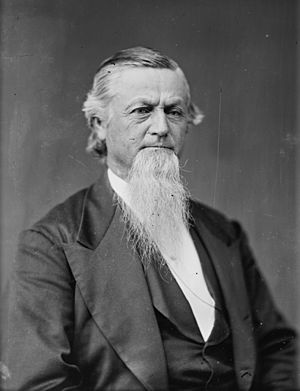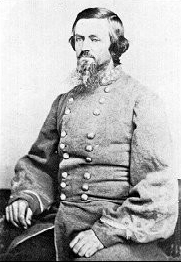George Gibbs Dibrell facts for kids
Quick facts for kids
George Gibbs Dibrell
|
|
|---|---|
 |
|
| Member of the U.S. House of Representatives from Tennessee's 3rd district |
|
| In office March 4, 1875 – March 3, 1885 |
|
| Preceded by | William Crutchfield |
| Succeeded by | John R. Neal |
| Member of the Tennessee House of Representatives | |
| In office 1861 |
|
| Personal details | |
| Born | April 12, 1822 Sparta, Tennessee |
| Died | May 9, 1888 (aged 66) Sparta, Tennessee |
| Political party | Democratic |
| Spouse | Mary E. Leftwich Dibrell |
| Children | Wamon L. Dibrell Frank Simpson Dibrell |
| Alma mater | East Tennessee University |
| Profession | lawyer, farmer, merchant, judge, banker, railroad executive |
| Military service | |
| Allegiance | |
| Branch/service | |
| Years of service | 1861–1865 |
| Rank | Brigadier General |
| Unit | 25th Tennessee Infantry |
| Commands | 8th Tennessee Cavaly Dibrell's Cavalry Brigade Dibrell's Cavalry Division |
| Battles/wars | American Civil War |
George Gibbs Dibrell (born April 12, 1822 – died May 9, 1888) was an important American figure. He was a lawyer, a five-time member of the United States House of Representatives for Tennessee, and a general in the Confederate States Army during the American Civil War. He also became a successful railroad executive.
Contents
Early Life and Family
George Dibrell was born in Sparta, Tennessee, on April 12, 1822. His family had a long history in America. His ancestors were Huguenots, who were French Protestants who came to Virginia in the 1700s seeking freedom. His grandfather fought for American independence in the American Revolution.
Growing Up in Tennessee
George's father, Anthony Dibrell, moved to White County, Tennessee, in 1811. He was a public servant, working as a court clerk and a state legislator. He even became the State Treasurer of Tennessee.
Young George worked on his family's farm during the summers. When he was 15, he traveled far by himself, moving livestock to Virginia and Mississippi. He didn't get much formal schooling, mostly attending local schools in the winter. He spent just one session at the University of Tennessee when he was 16.
Marriage and Children
In 1842, George Dibrell married Mary Elizabeth Leftwich, who was also from Sparta. Mary had a good education from the Nashville Female Academy. Both George and Mary became members of the Southern Methodist Church the same year they married. Mary taught Sunday school at their church in Sparta. They had eight children together.
Building a Career Before the War
George Dibrell studied law and became a lawyer in 1843. Besides his law practice, he also worked in farming and trade. He was elected as a clerk for the Bank of Tennessee in Sparta. He also served as a justice of the peace and a county clerk for White County for many years.
A Successful Businessman
By 1850, George Dibrell had built up a significant estate worth $500. Just ten years later, in 1860, his personal wealth had grown to $27,000. This made him one of the wealthiest landowners in White County. He was known as a successful merchant during this time.
Public Service and Military Role
Joining the Confederate Army
When the American Civil War began, George Dibrell joined the Confederate States Army. He served from 1861 to 1865. He started as a private in the 25th Tennessee Infantry and quickly rose to lieutenant colonel in August 1861. He fought in important battles like the Battle of Mill Springs and the Siege of Corinth.
Later, Dibrell formed a group called the "Partisan Rangers" in White County. He then raised the 8th Tennessee Cavalry and became its first colonel. He played a key role in defending important saltworks during the Battle of Saltville. He served under famous cavalry generals like Nathan Bedford Forrest and Joseph Wheeler.
Rising Through the Ranks
In early 1865, Dibrell was promoted to brigadier general. He commanded a division under General Wheeler during the Carolinas Campaign, including the major Battle of Bentonville. After the Confederate capital of Richmond fell, he helped protect the Confederacy's national archives. He also escorted President Jefferson Davis from Greensboro, North Carolina, into Georgia. He was captured and released near Washington, Georgia, on May 9, 1865.
Early Political Steps
Before the Civil War, in July 1861, Dibrell was chosen as a delegate for the Union side to a Tennessee State Constitutional Convention. This convention was meant to discuss whether Tennessee should leave the United States, but it never actually met. Dibrell was also elected to represent White County in the 1861 Tennessee State Legislature. He served there for only a few weeks before joining the Confederate Army.
First Military Engagements
George Dibrell left for military service in the summer of 1861, leaving his wife Mary and their seven young children. He joined the 25th Tennessee Infantry on August 10, 1861. He was elected Lieutenant Colonel of his regiment.
His unit marched to Camp Beech Grove in Kentucky to prepare for a possible attack. This led to the Battle of Mill Springs on January 19, 1862. This was one of the first big victories for the Union side. During the battle, the Confederate forces were outflanked and had to retreat, leaving behind their supplies.
In May 1862, Dibrell left the 25th Tennessee and traveled to Richmond. He got permission to raise a new regiment for the Confederacy. He returned home to Sparta and formed an independent cavalry force called "partisan rangers." This group became the 8th Tennessee Cavalry, organized on September 4, 1862, with 920 men. George Dibrell was elected its Colonel. His oldest son, Wayman Leftwich Dibrell, joined the regiment as a 2nd Lieutenant at age 19.
Post-War Politics
After the war, Dibrell continued his involvement in politics. He was a delegate to the Tennessee state constitutional convention in 1870. He was elected as a Democrat to the United States Congress five times, serving from March 4, 1875, to March 3, 1885. He decided not to run for re-election in 1884. After his time in Congress, he went back to farming and his business ventures, including developing several coal mines.
Business Ventures After the War
Overview of His Businesses
George Dibrell owned over fifteen thousand acres of land in White County. He started the Bon Air Coal & Coke Company, which became a major industry and employer in the county. He was also very important in developing the Southwestern Railroad, which connected Sparta to the main Nashville and Chattanooga line. He served as the President of this railroad in 1869. Dibrell also attended Methodist conferences in Memphis and Nashville.
Developing Railroads
After returning home in 1865, Dibrell worked to help his hometown of Sparta grow. He focused on bringing railroad lines to the area, including branches of the McMinnville and Manchester Railroad, the Nashville and Chattanooga Company, and the Southwestern Railroad Company. Before this, goods had to be moved by land, which was slow.
Plans to extend a railroad to Sparta existed before the war but were stopped. Dibrell became a director of the Southwestern Railroad Company and was elected its president in 1869. He stayed in this role for 15 years until the company was bought by the Nashville and Chattanooga Company in 1884. The arrival of the railroad greatly helped White County by providing a faster way to move goods.
The Bon Air Coal Company
As the railroads were being built, Dibrell also focused on creating the Bon Air Coal, Land, and Lumber Company. This company was located on Bon Air Mountain near Sparta. It was a long-time dream of Dibrell's. He had wisely invested in and bought over 15,000 acres of land rich in coal and timber.
The company officially started in September 1882. By 1900, its land holdings had grown to about 38,000 acres. Dibrell chose to be the vice-president of the company, and former governor John C. Brown became the president.
Later Years and Legacy
George Gibbs Dibrell passed away on May 9, 1888, at his home in Sparta. He was 66 years old. His death was caused by kidney inflammation, which was made worse by a long horseback ride he took two weeks earlier. He was survived by his wife Mary, his eight children, and many grandchildren. The same minister who married him and Mary 46 years earlier performed his funeral service.
A Nashville newspaper, the "Daily American," wrote that Dibrell "has done more for White County than any man who ever lived here." He is buried at the Old Sparta Cemetery, overlooking downtown Sparta.
Images for kids
 | John T. Biggers |
 | Thomas Blackshear |
 | Mark Bradford |
 | Beverly Buchanan |



